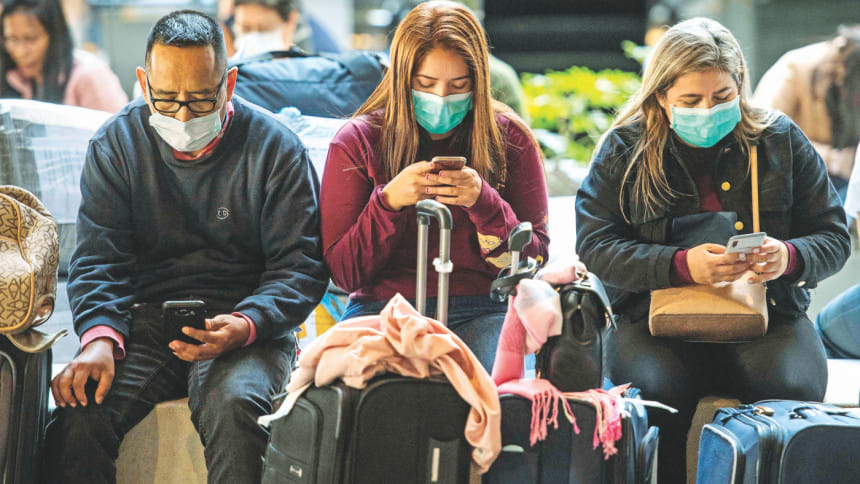Coronavirus and the politics of xenophobia

Airports beef up security, a ship full of passengers remains quarantined and docked at Yokohama, while racism takes root and flourishes under the shadow of an outbreak.
A novel virus, which has affected around 60,000 individuals, killed over 1,350 people globally, and reached 24 countries till now, has laid bare how it takes only a nudge to unleash xenophobic—intentional, subconscious, or institutional—values against a certain community.
Questionable memes attacking the Chinese as a whole are flooding the Internet. These justify the racial attack against the Chinese by basing it on their "food habits". The scientific journal, Nature, has mentioned the coronavirus's probable ties to pangolins—animals used for making "Traditional Chinese Medicine"—although the declaration is yet to be made formally.
Once I saw a comment that stated that even though being xenophobic against the backdrop of the coronavirus's outbreak was not and should not be justified, the Chinese needed to "be called out for their food habits". An entire community, viewed as a single body, was inculpated, just like that. A blanket generalisation shunning the diversity and multiplicity of a community was evident in that comment.
That comment, unfortunately, does not echo an isolated view. It echoes a view shared by many who, knowingly or unknowingly, fall into the traps of hasty generalisation. It also echoes subtle xenophobia.
I can only imagine what their (those who propagate xenophobia) responses would be had the communities they belong to been on the receiving end of a global xenophobia. Among others, those who share the Muslim identity can understand it well—for example, how it feels to be accused of being an Al-Qaeda fan due to the havoc wreaked by extremist terrorist groups.
In Leicestershire, two students were pelted with eggs, upon mistakenly deemed to be Chinese. In Los Angeles, a woman was verbally abused on public transport because of her Chinese descent after the virus's outbreak. A half-Chinese boy was "chased" and "cornered" in his school. The internet is filled with such stories of xenophobic behaviour against the backdrop of the global outbreak. #IAmNotAVirus, a vivid window into the high-spirited surge in racism, is now trending on Twitter.
The current scenario makes one reach some unsettling conclusions: that xenophobia has always been there and the outbreak of a virus is only the pathway that allows and sustains its channelling; that racism probably stays at a distance until a moment comes when only the tag of a certain community is related to a certain thing or event causing global concerns; that no one is safe from the talons of hasty generalisation—even though you are totally a different, autonomous being, the communal tag drilled into your identity will perhaps always incriminate you for things you have no control over; that regrettably, a community is often singularised, and utmost panic, at times subconsciously, at times consciously, drives its multiplicities into the wasteland.
It is absurd to think that earlier we had to derive these observations from terror attacks and now other mediums are gaining the limelight. In the future, we will probably be exposed to newer mediums uncovering xenophobia, bigotry, and other forms of toxic biases.
In the age of social media, memes seem to be the frontrunners for blatant expression of racism, as they gain attention of the masses by making derogatory puns and reigniting old biases against the Chinese culture in a new light. This is no new, divine finding; but the heavy normalisation of using a certain culture as fodder for racist, prejudicial, biased entertainment only reaffirms the fact that the perception generated by these racist means gives rise to the proliferation of this sick process. It also shapes the thinking of impressionable groups that find themselves on common platforms for directing their inner racism and, in the process, singularising a community on the grounds of stereotypes based on race and culture.
Old stories, new windows.
The invisible trap of generalisation catches its victims in the atmosphere of trepidation and fear surrounding public emergencies. Even though it sets out to catch its victims, it gives one the opportunity to choose between sides—a blatantly xenophobic one that capitalises on individual safety and views and warrants prejudices in a moral light, and a thoughtful one that allows oneself to believe that a certain community is not a solitary build-up of the same bones.
It is, perhaps, one of the many tests of the current time to see how people all over the globe can avoid the trap or fall into it.
Shah Tazrian Ashrafi is a freelance writer and a student of International Relations at Bangladesh University of Professionals.
Email: [email protected]

 For all latest news, follow The Daily Star's Google News channel.
For all latest news, follow The Daily Star's Google News channel. 



Comments